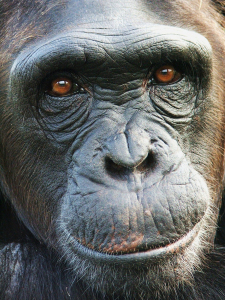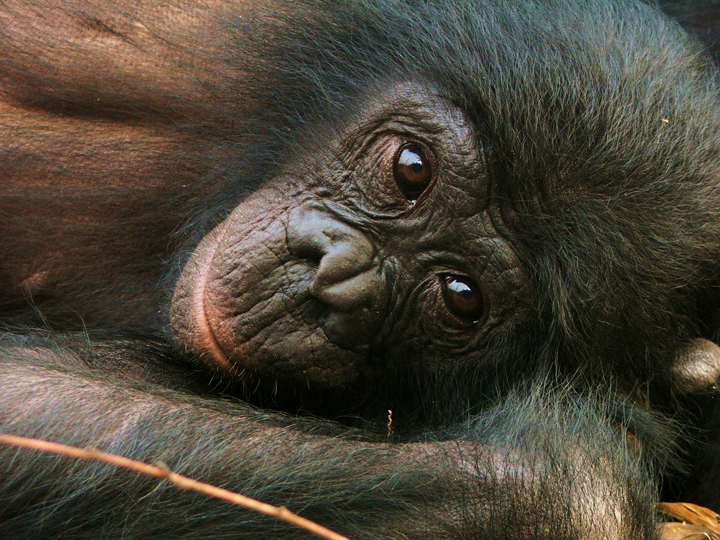When It Comes To Gambling, Are You A Chimp Or A Bonobo?
Whether it’s cucumbers or cash, we primates get all emotional. A study on decision-making among apes sheds light on our own species.
By Vicki Croke
In the audience, this past weekend, the speaker had us all laughing hard, not something you might expect from a lecture titled “Evolving Volition: Evidence from Ape Decision-Making,” which was part of a scholarly Harvard University Symposium on “Animal Consciousness.”

Alexandra Rosati, a researcher at Yale, who conducted the study, says the chimps “were happy to gamble, but not happy to gamble and lose.”
But Alexandra Rosati, a researcher at Yale, was showing us videos of chimps who were participating in a study that tested elements of decision-making, of “gambling,” and of how fundamental emotion is to all of this.
And when two chimps “gambled” and lost—receiving a lousy cucumber slice rather than a delicious banana, they threw tantrums.
The first, a male named Timi, spits out the cucumber and vocalizes in frustration. The second, a female named Isabelle, reacts by immediately trying to rewrite history– to give back her selection and reach for the other bowl. Too late. No do-overs after you’ve seen the answer. She somersaults backward, and pummels the offending vegetable into the ground.
Timi, the chimpanzee, chooses the risky option over a safe option. After the experimenter reveals that he received a bad outcome, he vocalizes and bangs. (Rescued chimps in the study lived in a sanctuary with access to the wild, and they completed no more than one test session per day.)
[youtube=http://youtu.be/33Hmnx5GAqk]
I think a big part of the reason it was so funny to those of us attending the symposium is that we recognized ourselves in those petulant, regretful, how-could-I-have-done-that reactions. And seeing ourselves in those chimps was in part, the point of the study. It seems that in chimps and bonobos, our closest relatives, we can detect the roots of human emotion.
For the work, Rosati observed 15 bonobos and 23 chimps, all rescued animals, in two separate sanctuaries. The chimp sanctuary, in the Republic of Congo, which gives chimps lots of time in the forest, is run by the Jane Goodall Institute. The bonobo sanctuary, Lola Ya Bonobo, is in the Democratic Republic of Congo. In both places, the apes have access to the outdoors, and the experiments were set up as games.
There were two different experiments.
Bonobos, who live in a salad bowl environment, were less patient and less likely than chimps to bet. (Photo: Alexandra Rosati)
In one, a “delayed gratification task,” the apes had a choice: they could immediately receive a small amount of food, one grape for instance, or wait two full minutes in order to obtain a larger portion—like six grapes. Chimps were more likely than bonobos to wait for the big payoff. In the other experiment, they could obtain a known, but boring or small food item or “gamble” on a mystery bowl, which might or might not contain a high-quality treat. Chimps were more often the high-stakes rollers in this.
This may have to do with the different environments the two species live in. Chimps have to deal with more competition and seasonal variability in food, while bonobos basically live in a salad bowl.

Chimps are patient, emotional, and willing to gamble when it comes to food. (Photo: Alexandra Rosati)
What shocked me is that the “patient” species was also the “gambling” species. I had previously thought of gamblers as impetuous. But this just means I’m jumping to conclusions (about chimps AND people) that the researchers don’t.
Alexandra Rosati, the speaker, conducted the study with Brian Hare from Duke University, and published the results last year in the journal PLOS ONE. At the symposium this weekend, she told us that she believed this work can “shed some light on why we humans make the decisions that we do.”
As we all know only too well, and sometimes to our disappintment, emotion plays a critical role in how we make decisions both big and small. You know: you buy a house with a leaky roof because the kitchen smelled like your mother’s apple pie. In the study, Rosati was targeting the roots of that.
She told the Daily Mail:
“Psychologists and economists have found that emotions play a critical role in shaping how humans make complex decisions, such as decisions about saving or investing money.
But it was not known if these processes are shared with other animals when they make decisions about their important resources – such as food.”
The videos Rosati showed made it clear. Bad bets with crummy payoffs resulted in tantrums. That was for both chimps and bonobos.
So, yes, for both species, emotion enters the picture in decision making and facing the consequences. The chimps “were happy to gamble,” Rosati says, “but not happy to gamble and lose.” Hmmm. Sound familiar?
Chimps high up in the trees of Tchimpounga Sanctuary. (Photo: Alexandra Rosati)
What is still unanswered is whether these emotional experiences will help the animals’ decisions in the future. If they are like some of us, who keep doing the same things but expecting different results, maybe they won’t. Let’s hope the apes are smarter.


